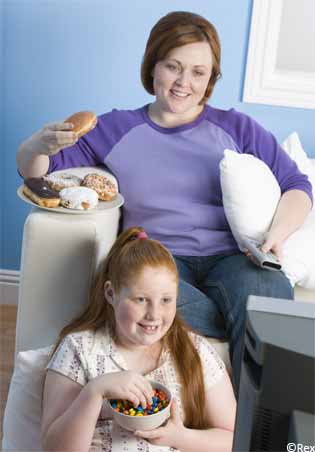 Yahoo Lifestyle
Yahoo LifestyleHow to discuss being overweight with your child
Fears of harming self esteem and causing eating disorders make parents unwilling to discuss weight and fat even if their child is overweight, according to new research

Parents are so worried about hurting their child’s feelings they don’t bring up difficult issues about being overweight and unhealthy, according to new research.
[Related: Soft drinks linked to obesity epidemic]
Of 1,000 parents with a child aged 5-16 polled by social enterprise MEND (Mind, Exercise, Nutrition…Do it!) and Netmums, more than a third (37 per cent) felt that talking to their child about weight would lower their self esteem.
Two thirds of parents want more support around discussing weight issues with their child and almost half of parents whose child is obese or overweight said that discussing the issue was an unhelpful experience for the family.
“I was a healthy weight until my late teens. Growing up with an obese mother and watching her try different diets has had a negative effect on me as an adult. I’m now worried about doing the same thing to my daughter,” one parent admitted in the questionnaire, echoing the voice of many respondents.
Parents also find it difficult to tell if their child is overweight or obese and are more likely to measure them against other children than use more accurate methods.
“With obesity reaching epidemic proportions and becoming the 'norm', it can be very difficult for parents to tell if their child is a healthy weight or not simply by looking at them,” said Paul Sacher, co founder of MEND. “The easiest way to check if your child is a healthy weight or not is to measure their weight and height and then to use an online BMI calculator.
It’s not surprising parents are concerned, however, with news that five year olds now worry about how they look and that half of the UK population struggles with negative body image. But as the obesity rates soar, there has to be a middle ground. MEND offered us some tips on starting the conversation.
1. Prepare the ground
Make use of news stories and magazine articles to talk about the importance of being healthy for everyone. It may be helpful to do this for a couple of weeks before raising the issue more directly.
1. Emphasise health not attractiveness
Be careful not to link being ‘thin’ with being successful or attractive – challenge these messages when you see them in the media. Make sure they understand that – for you – weight is simply a health issue.
3. Be a healthy role model
Make sure that your child sees you making wise lifestyle choices and looking after your own body. Don’t put yourself down about your own size in front of your children or they will learn to do the same.
4. Don’t blame or shame
Today’s kids are living in a toxic environment and making healthy lifestyle choices is difficult for everyone. Don’t use words such as ‘lazy’ or ‘greedy’ as this will erode their self-esteem.
5. Be positive
As a parent, you will know that serious problems are usually best solved by a sense of fun and creativity. There are now plenty of fun programmes out there to help you and your child learn together how to look after the family’s health.

